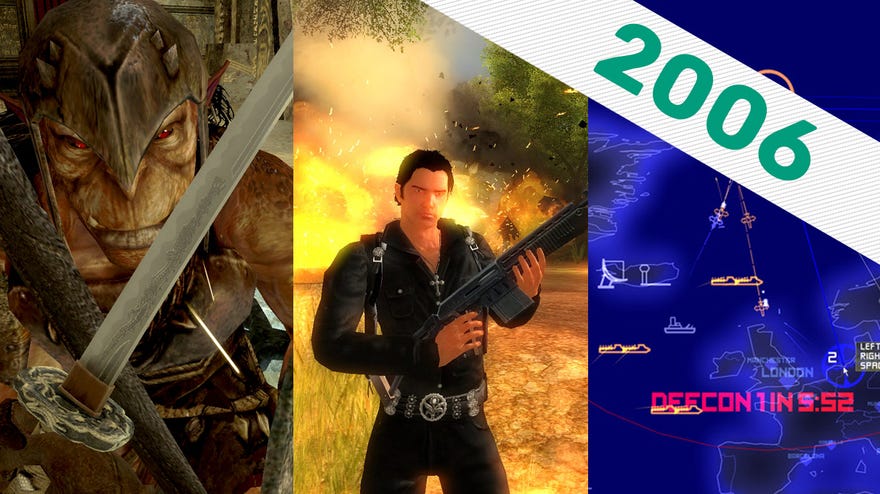RPS Time Capsule: the games worth saving from 2006
We list our favourite games from 2006, and why they deserve to be preserved above everything else
The RPS Time Capsule returns for its first outing of 2023, and this time we're casting our minds back to the hallowed year of 2006. Little did we know it at the time, but this is the year we start to see the birth of certain game series that are still alive and kicking today (just about), as well as the nascent beginnings of now beloved studios honing their craft on some of their very first titles. But which of those games have earned themselves a spot in the eternal RPS Time Capsule? Come and find out which ones have stood the test of time, and which, after reading this article, have been consigned to the smog-filled trashfire of future Earth.
As per usual, we're going by the year of a game's PC release here, not when it came out on consoles, and it's this particular version of the game we're preserving, too. That's why some games might be absent from their original release year, as they may have received a shiny HD remake or remaster in subsequent years we'd want to save instead (needless to say, our Time Capsule is not bound by what is and isn't available to physically buy in this day and age - it's the sentiment that counts). The RPS Time Capsule isn't intended to be a definitive best games of the year list, either. Rather, these are all our personal picks, and the ones we'd want to save from the apocalyptic hellfires should they ever arise. Ideally, they'll hold important lessons worth holding onto for future generations, or just be really goddamn great in their respective genres.
My biggest PC gaming memory from 2006 was mainly being dismayed that the laptop I'd just bought to take to university with me was not, in fact, capable of running the new Lego Star Wars game that year (the original trilogy), so that one's obviously been relegated to the fiery bins of spurned PC games. Naturally, though, with only ten available slots in our Time Capsule, there are bound to be some classics we've missed off the list, so why not remember them fondly in the comments below, as their PC boxes burn and crumble to dust around you?
Dark Messiah Of Might & Magic
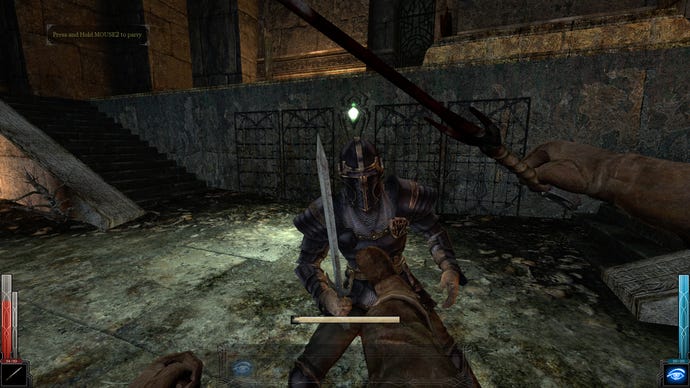
Alice0: I like to imagine the future people opening this Time Capsule and finding a game from Arkane Studios, those heroes of the immersive sim revival and big fans of interesting settings. And they will find Arkane's second game, an early game set amidst wholly generic and uninteresting fantasy guff, yet with exciting traces of the playful and creative immsims they would go on to make. Plus a whole load of kicking men off ledges and cliffs and into spikes and into fires and smashing oil jars to light on fire and making people slip on ice and breaking platforms onto their heads and throwing boxes into fires to set them alight, then throwing burning boxes at their heads and cutting ropes to drop rocks on them. And these future people will be delighted.
Dark Messiah Of Might & Magic is a singleplayer first-person stab-o-shooter with a few RPG touches. As you level up, you can pick freely across skill trees with your usual warrior, wizard, and rogue abilities, multiclassing as you wish. Lockpicking. Lighting bolts. Leap attacks. Backstabs. Fireballs. You get it. A Half-Life 2-style linear-ish story shooter with special abilities.
What makes Dark Messiah so magic is how much it leans into the hot game technology trend of the mid-to-early noughties: physics. Max Payne 2 had arsehole physics turning Max into a walking disaster who knocked over absolutely everything, Half-Life 2 built physics more into puzzles and moment-to-moment action, then Dark Messiah blew up HL2's Ravenholm into an entire game (DMOMAM is, by the way, also built on Valve's Source engine). Every level of Dark Messiah is Traptown, absolutely crawling with environmental hazards. Castles and crypts are decorated with inexplicable spike walls just waiting for you to knock a baddy in with a joyful kick. Building standards are shocking, with fragile walkways over pits and fragile shelves storing heavy barrels, all of which will collapse with a careful hit. Though I suppose the builders of that rope bridge probably weren't expecting anyone to cut the rope while people were crossing. Dark Messiah turns fights into optional puzzles where sure, you could stab baddies, or zap them, or climb a rope arrow into the rafters and snipe at them, but the real satisfaction comes from figuring out how to kill everyone with the environment (ideally in combination with your boot).
Dark Messiah is a perfect Time Capsule game for me because it captures a snapshot of past trends and a soon-to-be-prolific studio's history while still being fun today.
Just Cause
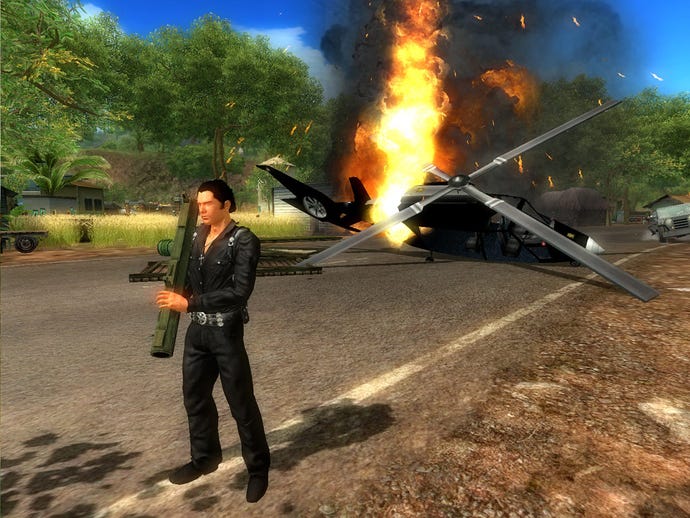
James: This series peaked with Just Cause 2. You know it, I know it, our starving, irradiated ancestors who open this Time Capsule will probably know it. But in 2006, the original Just Cause was already showing how much of a laugh you could have with a grappling hook and magically reusable parachute. The mid-air helicopter hijackings and impromptu base jumping these tools allowed for gave Just Cause a verticality and dynamism that other sandbox shooters just didn’t have at the time, even the (chronically underrated) Mercenaries. It was sunnier, too.
And the scope! Even if its banana republic archipelago wasn’t the most extensively detailed game setting of the year, I still remember it blowing my tiny mind when I flew halfway up to space and still couldn’t see the edge of Just Cause’s world. Besides, you don’t need thousands of map markers when there are other ways of staying entertained, and this first game of the series did plenty to set an endearingly chaotic tone for the ones that followed. One of the boss battles is against an elderly Nazi in a gyrocopter, so maybe I’m wrong, and Just Cause peaked right there?
Company Of Heroes
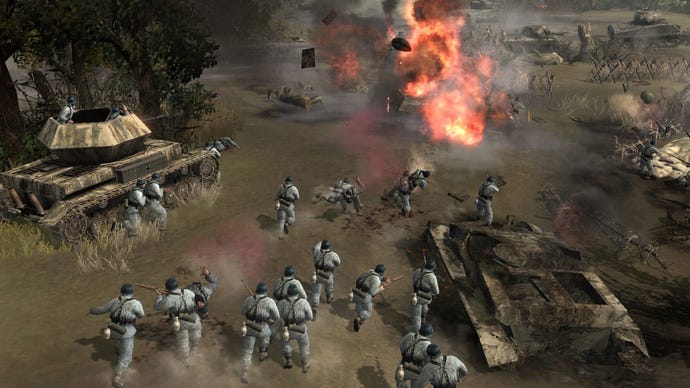
Katharine: The original and arguably best (at least until Company Of Heroes 3 comes out perhaps), the first Company Of Heroes continues to be one of the seminal real-time strategy games of our time. There were, of course, other World War II RTS games out there before Company Of Heroes came along, but this was the one that felt like it was bringing something new to the table. With the ability for soldiers to receive veterancy bonuses the longer they stayed on the battlefield, each unit felt vital to your mission's success. Moreover, it rewarded you for being clever with unit positioning, cover and making use of its destructible environments, resulting in tense, fast-paced battles that were no longer decided simply by who had the largest number of troops at their beck and call.
Visually, it also holds up surprisingly well considering its age. If nothing else, Company Of Heroes should be celebrated for just how timeless it feels, which is probably more than can be said for a lot of other games on this list (no disrespect, guys). Incredibly, it also continues to have a vibrant multiplayer scene, ensuring that even in the end days when this Time Capsule is eventually dug up, it still has the makings of a great co-op and competitive experience too. Assuming that the future end days still has viable internet, of course.
Tomb Raider: Legend
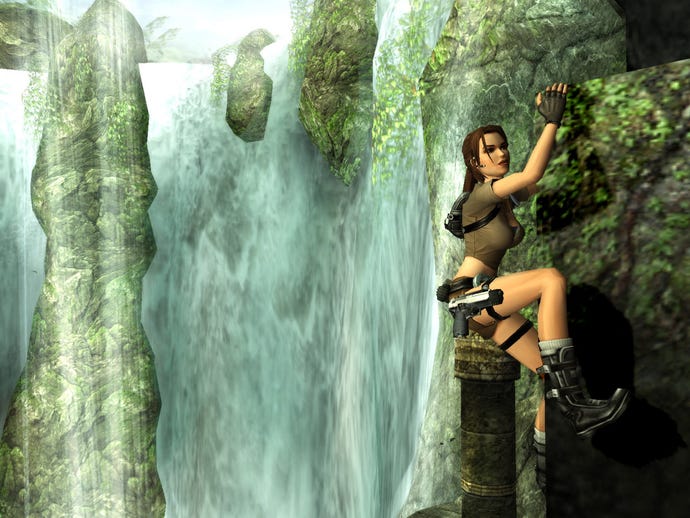
Rebecca: I submit Tomb Raider: Legend into the Time Capsule under slight sufferance. This game incensed my 15-year-old self upon release, because I'd had my heart set on a sequel to 2003's Tomb Raider: The Angel Of Darkness, and Legend not only threw that idea out of the window, but sent the whole continuity of the first six games flying along with it. Where was my narrative resolution? What became of Kurtis Trent in that cliffhanger ending? Why was Lara's backstory suddenly all different? You said it was going to be a trilogy, Eidos, you said.
But even an outraged hormonal fangirl had to admit that Legend did have some things going for it. Keeley Hawes was a bit of a crush of mine at the time, so the fact that she was the new voice of Lara Croft helped get me through the door, however reluctantly. And yeah, all right, the game was good, representing a much-needed graphical and technical upgrade for the series. Indeed, lingering resentment of its narrative betrayal aside, I'd be hard-pressed to argue that Legend doesn't still feel like it marked a significant step forward for a much-beloved franchise.
Marvel: Ultimate Alliance

Alice Bee: I flip-flopped on what to pick for 2006 many times, but when I saw Marvel: Ultimate Alliance came out in 2006, I knew it had to be that. Before the MCU was a twinkle in Robert Downey Jr.'s goatee, this game brought dozens of heroes from the comics together to fight a group of dastardly superheroes. Proper Saturday morning cartoon shit. It was brilliant! You put together a team of four supes, and bashed your way around isometric cutaway locations – secret labs, the helicarrier, Atlantis – and by god if it didn't feel like playing with chunky little action figures.
You could play co-op or switch control of the characters on the fly, but the best part was that characters could combine attacks for specials – Captain America deflecting Iron Man's beam of his shield, that kind of thing. No, you know what, scratch that. The absolute best thing was you got bonuses for having four characters on a team that made sense together. Four X-Men. The Fantastic Four. God, it was a great game. I don't think any co-op game since has nailed being so simple but so utterly enjoyable at the same time.
The Ship: Murder Party

Liam: Many years before the dinky space beans from Among Us started acting all sussy, my introduction to social deduction games came in the form of The Ship, a multiplayer focused murder-em-up that let you strangle strangers on an art-deco cruise liner. An early Source game, The Ship was messy. Maybe a touch over designed. The core premise was simple, however. Hunt down your target and kill them in a creative way. A frying pan to the head, perhaps. Lock them in a freezer. Pour a bit of poison in their wine. You know. The usual stuff.
But ah! A twist! You yourself are also being hunted, and must assume that every other player is seconds away from stabbing you in the guts. In 2006, The Ship felt like a revelation, a multiplayer game that felt smarter and more complex than those that asked you to plant bombs ad nauseum. Maps took place on different ships, but each contained multiple shops, bars, restaurants and crew areas to explore. Your character had Sims-like needs, for some reason, so your murder spree would be constantly interrupted by needing to piss or to put on a new hat. Security guards kept watch, too, and any foul play would result in a time out in the ship’s brig.
It was good, silly fun. Twee by today’s standards I suspect, and bettered by Assassin’s Creed and Among Us, but still a personal favourite. Yes, I’m aware it received a remaster in 2016. I think it’s best we all just pretend that it didn’t.
The Elder Scrolls IV: Oblivion
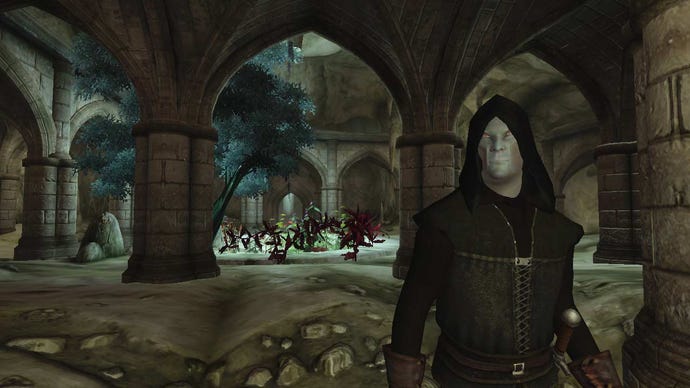
Ed: I am convinced Oblivion's fantasy setting of Cyrodiil is the closest you can get to a waking lucid dream. Break out of jail and you're in this lush landscape, with golden hues and soft textures and warm strings that accompany your wanderings. I like how it frames its world through its mundane, little details, too. Dirt paths may simply lead to quaint huts in the middle of the woods or moss-covered ruins pocked with red mushrooms. There's a sense that you're exploring somewhere that makes sense for its inhabitants, rather than a showroom for achievement hunters.
Dreams are bizarre too, right? And Oblivion shines in this department, with crash-zooms to faces that look like they're pressed up hard against a layer of clingfilm, and priceless conversations between eccentrics: "I saw a mud crab the other day", "By what right do you disturb me?!", "Take care". This unpredictability extends to random scraps between NPCs outside city gates, or parallel worlds born from an impressionist's brush strokes. For all of these reasons and many more, Cyrodiil deserves to be preserved in the Treehouse's special resin.
Stronghold: Legends
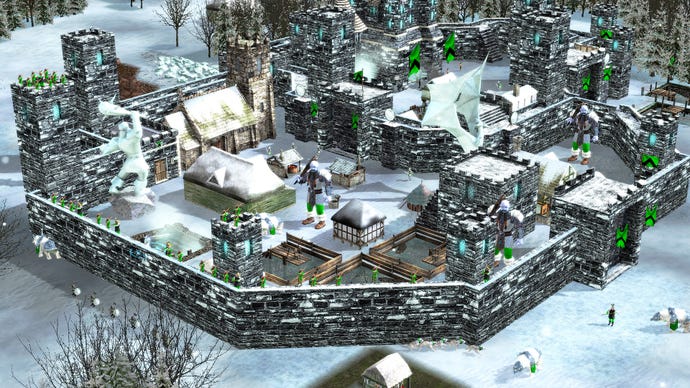
Ollie: It turns out that, for an eleven-year-old Ollie, all that's needed to improve upon the Age Of Empires formula is a generous helping of dragons, demons, and werewolves being catapulted over the walls of one's enemies. Although to be honest, it was less about the use of such fantastical creatures and more about the promise of them. Back then, I played real-time strategies like base-builders - tycoon games, even. I'd insulate myself behind layers of castle walls and slowly build up a fearsome economy, based on the production and sale of hops and eels. And then when I'd reached the apex of my stronghold's might, I'd wade my army across the map and obliterate my enemies in a victory lap of fantasy carnage.
And during that victory lap, I'd notice dragons curled around their treasure hoards at the centre of the map, and think to myself, "Ah yes, dragons. Awesome." And continue on my merry crusade towards the enemy stronghold, without interacting with the dragons at all. I didn't need to. Their presence was apparently all that was needed to make me keep playing Stronghold Legends for many hours after school.
DEFCON

Hayden: Playing DEFCON for the first time is like going to Wagamamas and reassuring the waiter that you can handle spicy food. You’re like, “SURE, HAHAHA, THANKS MATE”, and then you wait patiently and consider your life choices. This is DEFCON. That panicked response and subsequent self-doubt is the rapid set-up stage. You place radars, silos, airstrips, and fleets in a flash and then stare at it all for minutes, questioning every decision. The wait feels eternal.
And then the food comes. You take a little bite and it doesn’t seem that spicy, right? So you get a forkful and chew, making noises like “mmmm” and “ooooo” before realising that oh no, this was a mistake, ohmygod, and you spit it all out. Again, this is DEFCON. Your little ships start to battle each other, the silly bastards sinking all over. Fun! And then it moves into DEFCON 1, nukes start flying, and any semblance of control gets discarded.
It’s horrifying, really, but that carnage makes DEFCON a delectable bite-size portion of strategy. It lures you in with tactical building placement and unit management, before quickly throwing it all away in the final moments. The ensuing carnage is horrifying, but for a bunch of pals on Discord, it’s also filled with panicked screams and infectious laughter as our little planet is consumed with nuclear warfare. It’s grim, but an experience worth preserving all the same.
Pathologic
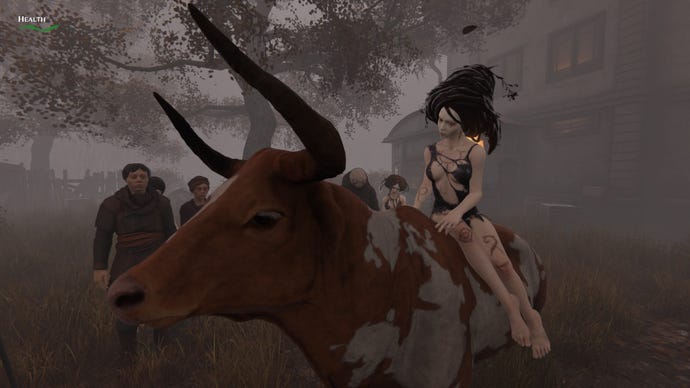
Rachel: Pathologic is a game I will never play, but I’m hurling it into our Time Capsule anyway to solidify a small part of weird gaming history. Yes, it came out in Russia in 2005 but it released in the UK in August 2006 so, that's the excuse I’m giving to talk about this strange, wonderful game.
Pathologic is a psychological survival game where you play one of three healers trying to save a town from being eradicated by a disease, and you only have twelve days to do it. As the plague spreads and people start dying, any hope of saving them means you'll need to fit into the strange rhythms and routines of the town, talking to people and trying to find out more info about the disease and how to stop it. Sounds easy enough, but it’s hard to not play Pathologic and feel like the game actively hates you and wants you to fail. It’s a constant struggle not to get sick, malnourished or just straight up dead, and if your reputation slips people will just stop talking to you, or worse, keep attacking you.
If you can handle all that, you are rewarded for it. The way the story unfolds is complex, strange, and brilliant all at the same time in a way that, without exaggerating, elevated interactive storytelling in gaming. It would be nice if it was more accessible to those who attempted to play it but that just adds to its mythos. Again, I will never play Pathologic, but I love reading and listening to people talk about it in articles, comment sections, forums, and two-hour YouTube essays. Into the safety of the Time Capsule it goes!
